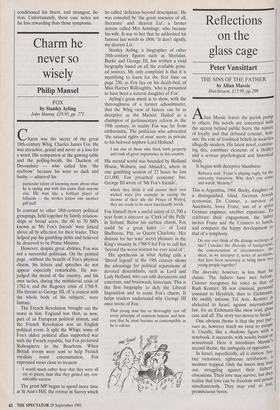Charm he never so wisely
Philip Mansel
FOX by Stanley Ayling John Murray, £19.95, pp. 271 Charm was the secret of the great 18th-century Whig, Charles James Fox. He was attractive, genial and never at a loss for a word. His companion at the gaming-table and the polling-booth, the Duchess of Devonshire — who called him 'the eyebrow' because his were so dark and bushy — admired his
particular talent of knowing more about what he is saying and with less pains than anyone else. He was like a brilliant player of billiards — the strokes follow one another piff paff.
In contrast to other 18th-century political groupings, held together by family relation- ships or broad acres, the 60 to 70 MPs known as 'Mr Fox's friends' were linked above all by affection for their leader. They helped pay his gambling debts and believed he deserved to be Prime Minister.
However, despite great abilities, Fox was not a successful politician. On the printed page , without the benefit of Fox's physical charm, his letters and speeches do not appear especially remarkable. He mis- judged the mood of the country, and his own tactics, during the ministerial crisis of 1782-4, and the Regency crisis of 1788-9. His threats to George III, of 'a contest with the whole body of his subjects', were fantasy.
The French Revolution brought out the worst in him. England was then, as now, part of an European political system, and the French Revolution was an English political event. It split the Whigs: some of Fox's oldest political allies supported war with the French republic, but Fox preferred Robespierre to the Bourbons. When British troops were sent to help French royalists resist extermination, Fox expressed views close to treason:
I would much rather hear that they were all cut to pieces than that they gained any con- siderable success.
The great MP began to spend more time at St Ann's Hill, the retreat in Surrey which he called 'delicious beyond description'. He was consoled by 'the great resource of all, literature' and 'dearest Liz', a farmer actress called Mrs Armitage, who became his wife. It was to her that he addressed his famous last words in 1806: 'It don't signify, my dearest Liz.'
Stanley Ayling, a biographer of other 18th-century figures such as Sheridan, Burke and George III, has written a vivid biography based on all the available print- ed sources. My only complaint is that it is mystifying to learn for the first time on page 230, as Fox lies on his death-bed, of Miss Harriet Willoughby, 'who is presumed to have been a natural daughter of Fox'.
Ayling's great merit is to show, with the thoroughness of a former schoolmaster, that the Whig view of history can be as deceptive as the Marxist. Hailed as a champion of parliamentary reform in the 19th century, in reality Fox was far from enthusiastic. The politician who advocated `the natural rights of man' wrote in private to his beloved nephew Lord Holland:
I am one of those who think bdth property and rank of great importance in this country.
His mental world was bounded by Holland House, Woburn, and Almack's, where in one gambling session of 22 hours he lost £11,000. Fox preached economy; but, George HI wrote of 'Mr Fox's friends',
where they think it will answer their own wicked ways [for example in raising the income of their ally the Prince of Wales], they are ready to be most barefacedly lavish.
Fox himself drew a useful salary of £1,700 a year from a sinecure as 'Clerk of the Pells' in Ireland. Below his surface charm, Fox could be a great hater — of Lord Shelburne, Pitt, or Queen Charlotte. Her distaste for her sons' secret pleasure in the King's insanity in 1788-9 led Fox to call her `beyond the worst woman we ever read of '.
His apotheosis as what Ayling calls a `liberal legend' in the 19th century shows the advantage for political reputations of devoted descendants, such as Lord and Lady Holland, who can edit documents and entertain, and brainwash, historians. This is the first biography to defy the Liberal Inquisition and to resist Fox's charm. It helps readers understand why George III once wrote of Fox:
That young man has so thoroughly cast off every principle of common honour and hon- esty that he must become as contemptible as he is odious.


































































 Previous page
Previous page